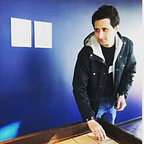This 3D bioprinting startup is trying to democratise human tissue printing by making their products available and easy to use.
A group of medical doctors and bioengineers needed a 3D bioprinter for their own research. When realising how hard it was to get hold of one they decided to make their own.
This resulted in the creation of a startup named Foldink that produces 3D bioprinters and bioinks.
Their mission is to solve the problem that they themselves once faced. Making 3D bioprinting available for as many people as possible.
Humanity has seen a huge paradigm shift in technology and medicine but yet we still rely on organ donors and the gap between receiver demand and donor supply continues to widen.
Only in the US there is one person added to the waiting list every 10 minutes
With 3D bioprinting we can finally start printing tissues with bioink that’s made up from cell culture. The boom of 3D printer and cell culture advancements has paved the way for new possibilities that could save lives.
Pharmaceutical companies drop 90% of their new products because of late stage clinical failures.
Why? because testing on mice and in vitro research isn’t the same as testing on humans. A biologically relevant research method needs to be implemented to save resources and make the drug development process more lean and efficient. By allowing testing on printed human cells we can avoid this scenario.
Even if we put these problems aside researchers need a researcher centered product. A product which is ethical, sustainable and biologically relevant. But like always a possible solution also has problems. Today only institutions and universities with a lot of resources can afford a 3D bioprinter and bioinks.
‘’Prices go up to 200.000$ for a 3D bioprinter and there’s no way the demand for this technology can be met at those prices’’ — Emmanuel Ghandilyan, Foldink CEO
A group of doctors in Armenia are trying to solve that. They needed a 3D bioprinter but couldn’t find a way to get their hands on one. So they decided to make their own and want to offer researchers and scientists like them a chance to use this technology.
The result was a startup named Foldink.
Foldinks bioprinters and bioinks are drastically cheaper than their competitors because they had to work in a setting where they needed to push prices down without compromising the quality of the printed tissues and the materials they use. They offer their users the alternative to use open source modeling software.
Letting the user use a open source software not only reflects their culture of making 3D bioprinting inclusive but also gives researchers a collaborative experience where more people can contribute with different specialities.
Foldink was recently featured in the 3D bioprinting world map in 3Dprint.com magazine.
If you are interested to know more about Foldink and their products they can be reached through Linkedin or the Foldink website
